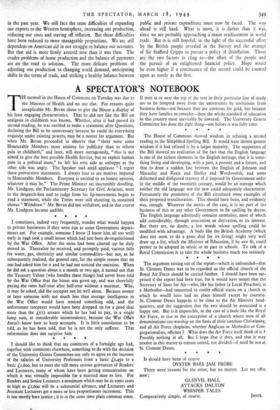The House of Commons showed wisdom in refusing a second
reading to the Simplified Spelling Bill. It would have shown greater wisdom if it had refused it by a larger majority. The supporters of the Bill showed no realisation of the fact that the English language is one of the richest elements in the English heritage, that it is some- thing living and developing, with a past, a present and a future, and that to draw a sudden line between the English of Johnson and Macaulay and Keats and Shelley and Wordsworth, and some deformed and disfigured travesty of it imposed by Government order in the middle of the twentieth century, would be an outrage which neither the old language nor the new could adequately characterise. Fortunately the promoters of the Bill circulated some examples of their proposed transliteration. This should have been, and evidently was, enough. Whatever the merits of the case, it is no part of the business of this or any other Government to fix spelling by decree. The English language admittedly contains anomalies, most of which add considerably, through association or derivation, to its interest. But there are, no doubt, a few words whose spelling could be modified with advantage. A body like the British Academy (which does not seem to do a great deal for its living) might very well draw up a list, which the Minister of Education, if he saw fit, could permit to be adopted in whole or in part in schools. To talk of a Royal Commission is to take the whole business much too seriously.






































 Previous page
Previous page